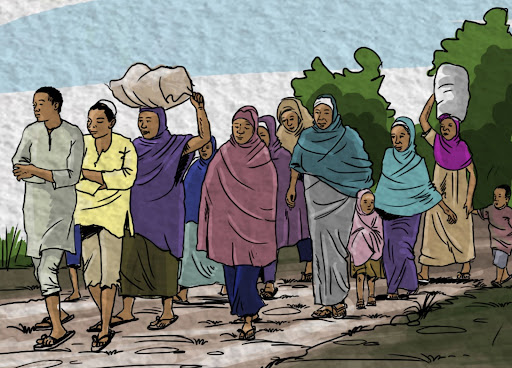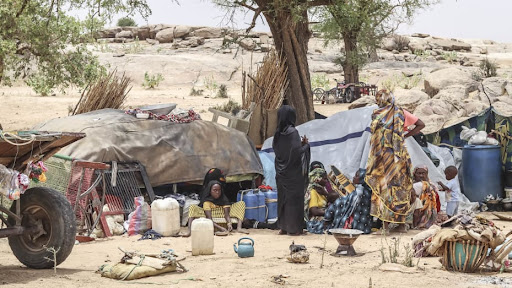Surge In Refugees And Displaced People In 2023
The World Refugee Day is commemorated on 20th June of each year to create awareness about the plight of refugees, advocate their rights, show compassion to their situation and salute their doggedness. The number of displaced people is rising.

The last year has seen a surge in the number of displaced people.
Data from the United Nations Refugee Agency (UNHCR) released for World Refugee Day, shows that more than 108.4 million people were forcibly displaced from their homes. This sudden increase is mostly down to the ongoing war in Ukraine.
If current world crises continue globally, the number of refugees and displaced people may reach up to 1 billion by 2050, more than 12 per cent of the world’s population, analysts say.
There are around 30 million internally displaced persons, refugees and asylum seekers in Africa, representing almost a third of the world’s refugee population.
Climate change, food insecurity and political violence are among the factors that dislocate Africans from their homes.
In the Norwegian Refugee Council (NRC) list of World’s Most Neglected Crises, seven of the 10 countries listed are African.
Africa rising
Burkina Faso, Burundi, the Democratic Republic of the Congo, Ethiopia, Mali, Sudan, and Cameroon join the other three, Colombia, Venezuela, and El Salvador.
There are fears that the ongoing political war between the Sudanese Armed Forces and Rapid Support Forces will further exacerbate the situation of the refugees across the continent.
The United Nations has reported that nearly 1.4 million people have been newly displaced since 15 April when the crisis broke out, including 1 million people displaced internally and 330,000 who have crossed into neighbouring Ethiopia, Chad and Eritrea.

Over 100,000 Sudanese refugees have reached eastern Chad. A larger humanitarian response is needed according to medical NGO Médecins Sans Frontières (MSF).
Aid groups are also running out of funds. The NGOs have been appealing for more funds as the war continues with no end in sight.
The number of displaced people may increase as both SAF and RSF believe they can win militarily, which may have resulted in several failed ceasefires despite intervention by the international community.
Missing
In Nigeria too, the decade-long Boko Haram has uprooted many families from their homes since the conflict began. Many families have gone missing while fleeing from attacks.
The country is also home to urban refugees, the majority of whom have received individual refugee status determinations from the Nigerian government. They occupy urban regions throughout various States, as well as Lagos, Ijebu, Abuja, and Kano. They come from 41 different countries, the bulk of which being the Democratic Republic of the Congo, Niger, Central African Republic, Cameroon, Syria, Turkey, Mali, and 34 others.
The theme for this year’s World Refugee Day, ‘Hope away from home – a world where refugees are always included’, is timely as it reminds the international community of its responsibility to provide a safe space for them. Refugees should feel at home in the country they are taking refuge.
Including refugees in the communities where they have found protection is the most effective method to help them; this entails making sure they can apply for employment, enroll in schools, and access services like housing and healthcare.
If this is prioritised by governments, humanitarian organisations say, it will go a long way in ameliorating the plight of refugees.
Although similar, awareness should be created on the difference between a refugee, asylum seeker, migrant and an internally displaced person. And, why their rights should be protected.
Countries should also make a commitment to welcoming refugees into companies, educational institutions, healthcare systems, and other sectors on World Refugee Day as outlined in the 1951 UN Refugee Convention. Not just the commitment alone, but also highlighting the necessity of international cooperation, assistance, and long-lasting solutions to address the refugee issue.
By enabling them to prosper in a new nation or laying the groundwork for a secure return to their own lands, inclusion opens the door to long-term solutions for refugees and other displaced persons.
Support Our Journalism
There are millions of ordinary people affected by conflict in Africa whose stories are missing in the mainstream media. HumAngle is determined to tell those challenging and under-reported stories, hoping that the people impacted by these conflicts will find the safety and security they deserve.
To ensure that we continue to provide public service coverage, we have a small favour to ask you. We want you to be part of our journalistic endeavour by contributing a token to us.
Your donation will further promote a robust, free, and independent media.
Donate HereStay Closer To The Stories That Matter




